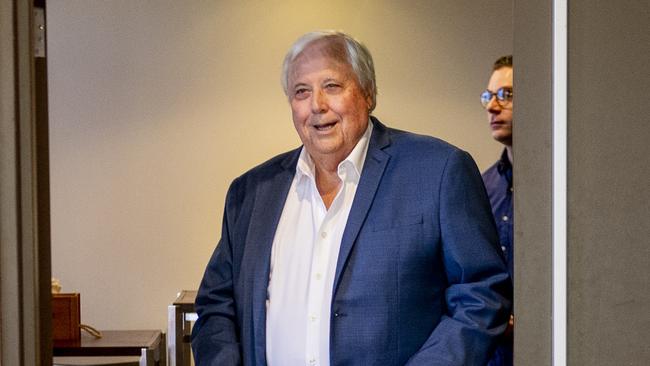Clive Palmer’s High Court bid to contest federal election
Mining magnate Clive Palmer chose to deregister his political party two years ago. Now, that decision means he’s off to the High Court.

Clive Palmer has launched a High Court bid for his United Australia Party to contest the upcoming federal election, after he fell foul of his own decision to deregister the party two years ago.
The mining mogul voluntarily deregistered the UAP in September 2022, sparking warnings at the time that he would be unable to legally contest the next poll under that registered party name.
Mr Palmer now claims the Electoral Act is “draconian and unconstitutional” and said he would ask the High Court to rule that section 135(3) is unconstitutional, because it bans a deregistered party from reregistering and contesting the next general election.
“We don’t believe the provisions of the Electoral Act are conducive to running a free and fair election as our Constitution demands,” he said.
“Labor is running scared. There will be a third force in the next election and it will be well supported. I am calling for all parties to join together to kick out the uni-party of Labor (and) Liberals which has destroyed our economy and increased our cost of living.”
In 2022, the resources magnate spent an estimated $100m at the federal election and ran candidates in nearly every lower house seat and Senate race. Despite the massive spend, only one candidate was successful: Victorian Ralph Babet won the state’s sixth Senate spot.
A few months later, Mr Palmer deregistered the party’s name, taking even Senator Babet by surprise.
The Australian understands Mr Palmer – a former federal MP for the Sunshine Coast seat of Fairfax between 2013 and 2016 under the Palmer United Party banner – chose to deregister so he did not have to report “his party spend”.
University of Queensland law school professor Graeme Orr – who has a research focus on electoral law – said the law was there to avoid voter confusion and “protect that party from just anyone running under that name”.
“Which invites the question, why did he deregister? There’s no annual fee like car rego. The obvious reason was to avoid annual disclosures about the party’s finances, which are intimately linked to his personal and corporate wealth,” Professor Orr said.
Professor Orr said Mr Palmer’s High Court claim did not really have legs.
“This is a minor technical rule; it raises no real issue of political communication or inequality in electoral competition. The cooling off period over deregistered names seeks to limit confusion and unfair competition. The law didn’t take away his name, he chose to deregister.”
A spokesman for the Australian Electoral Commission declined to comment on the specific case, but confirmed the Commonwealth Electoral Act prevented a political party from voluntarily deregistering itself and then re-registering before the next federal election.
“It is not, however, accurate to say that a deregistered political party is not allowed to contest an election,” the AEC spokesman said.
“There are benefits to having a registered political party, such as the ability to place that party’s name and logo next to candidates on a ballot paper or the ability to bulk nominate candidates on behalf of the political party.
“However, there is nothing stopping a political party that has voluntarily deregistered itself from participating in, and campaigning for, a federal election without making use of the benefits of being a registered political party.”
Senator Babet and Neil Favager, national director of the UAP, have lodged the High Court application, arguing the Electoral Act section is “invalid” and discriminates against unregistered political parties and their candidates. The statement of claim was prepared by Sydney-based barrister Dominic Villa SC and junior counsel Philip Santucci.
Last month, Mr Palmer - who has previously described litigation as one of his hobbies - threatened to launch a High Court challenge to Labor’s electoral donation reforms.
Earlier this year, he applied to the High Court for special leave to stop the corporate watchdog ASIC from pursuing him for alleged criminal dishonesty and fraud.
In 2020, Mr Palmer launched two High Court cases against the state of Western Australia, and lost both the following year.






To join the conversation, please log in. Don't have an account? Register
Join the conversation, you are commenting as Logout